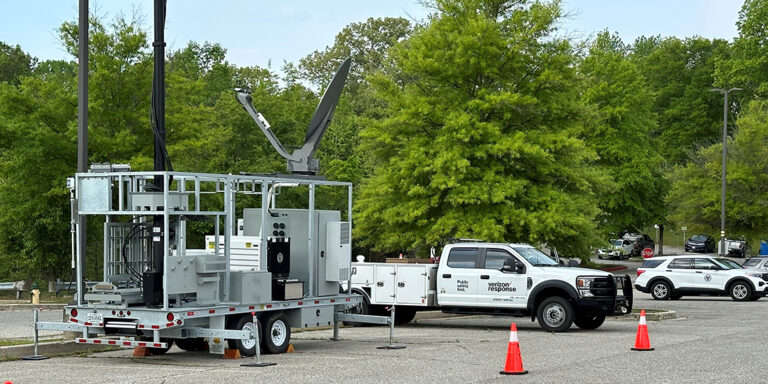
Article Archive by Year

Despite significant investments in public safety, critical training gaps for first responders persist. Regional planning committees, established by the FCC in the 1980s to manage public safety radio frequencies, remain key to improving interoperability. Learn about ongoing efforts—both regional and national—to close communication gaps and improve coordinated emergency response.

A Systems Thinking Approach to Improving Emergency Communications
April 16, 2025
“PACE” planning helps organizations fail gracefully, but systems thinking reduces the likelihood of failure altogether. Combining both approaches helps organizations build resilience, regardless of threat or hazard.

Know the Audience: Five Keys to Effective Communication
April 9, 2025
Effective communication starts with understanding your audience—who they are, what they know, why they’re listening, and what they need to hear. Learn how this awareness can help you deliver a message your audience will understand, connect with, and remember.

AI Software in 911 Dispatch Centers: An Innovative Solution
April 2, 2025
Coupled with continued staffing challenges, mental health and work-life balance difficulties in emergency call centers are cause for concern. By allowing artificial intelligence (AI) to take some of the burden off from existing staff and leadership, focus can be returned to where it is most needed within each center.

Agriculture Security: Systems-Based Preparedness
March 26, 2025
As economies and populations grow, the food and agricultural security is of increasing concern. This demands proactive investment in risk management and security measures to ensure the sustainability of the global food supply.

Editor’s Note – Protecting Food and Agriculture: Bigger Than Rising Egg Prices
March 26, 2025
The authors in the March 2024 edition of the Domestic Preparedness Journal share their expert insights on topics that may be overlooked by nonrural communities and why common agricultural and critical infrastructure operations should be on the minds of any emergency preparedness professional.

Farm to Power: New Hazards in Rural Communities
March 26, 2025
In the interest of reducing methane pollution and establishing a revenue stream for a renewable resource, dairy and livestock operators are creating mechanisms to produce compressed natural gas. This new technology reduces greenhouse gases but also introduces new hazards to rural communities.

Podcast – Advisory Board Spotlight: Interview With Anthony Mangeri
March 19, 2025
Anthony Mangeri is an educator and seasoned leader in emergency management. He is the chief operating officer of the Mangeri Group and the immediate past president of the International Association of Emergency Managers (IAEM) Region 2. Learn about Anthony’s passion for his field and for the Domestic Preparedness Journal.

Agricultural Supply Chain Vulnerability: A Freight Rail Disruption Case Study
March 19, 2025
The agricultural supply chain’s global interdependency introduces considerable vulnerability. The failure or weakening of even one of the supply chain links has cascading effects. Awareness of potential catastrophe across sectors is crucial to emergency preparedness.

Agroterrorism: A Persistent but Overlooked Threat
March 19, 2025
Agroterrorism is not new. Considered a subset of bioterrorism, it has become an increasing concern to the U.S. With so much of the agriculture sector in private hands, preparedness leaders must take extra steps to engage stakeholders and incorporate them into planning efforts.
A Regional Approach to Public Safety Communications Planning
April 16, 2025
Despite significant investments in public safety, critical training gaps for first responders persist. Regional planning committees, established by the FCC in the 1980s to manage public safety radio frequencies, remain key to improving interoperability. Learn about ongoing efforts—both regional and national—to close communication gaps and improve coordinated emergency response.
A Systems Thinking Approach to Improving Emergency Communications
April 16, 2025
“PACE” planning helps organizations fail gracefully, but systems thinking reduces the likelihood of failure altogether. Combining both approaches helps organizations build resilience, regardless of threat or hazard.
Know the Audience: Five Keys to Effective Communication
April 9, 2025
Effective communication starts with understanding your audience—who they are, what they know, why they’re listening, and what they need to hear. Learn how this awareness can help you deliver a message your audience will understand, connect with, and remember.
AI Software in 911 Dispatch Centers: An Innovative Solution
April 2, 2025
Coupled with continued staffing challenges, mental health and work-life balance difficulties in emergency call centers are cause for concern. By allowing artificial intelligence (AI) to take some of the burden off from existing staff and leadership, focus can be returned to where it is most needed within each center.
Agriculture Security: Systems-Based Preparedness
March 26, 2025
As economies and populations grow, the food and agricultural security is of increasing concern. This demands proactive investment in risk management and security measures to ensure the sustainability of the global food supply.
Editor’s Note – Protecting Food and Agriculture: Bigger Than Rising Egg Prices
March 26, 2025
The authors in the March 2024 edition of the Domestic Preparedness Journal share their expert insights on topics that may be overlooked by nonrural communities and why common agricultural and critical infrastructure operations should be on the minds of any emergency preparedness professional.
Farm to Power: New Hazards in Rural Communities
March 26, 2025
In the interest of reducing methane pollution and establishing a revenue stream for a renewable resource, dairy and livestock operators are creating mechanisms to produce compressed natural gas. This new technology reduces greenhouse gases but also introduces new hazards to rural communities.
Podcast – Advisory Board Spotlight: Interview With Anthony Mangeri
March 19, 2025
Anthony Mangeri is an educator and seasoned leader in emergency management. He is the chief operating officer of the Mangeri Group and the immediate past president of the International Association of Emergency Managers (IAEM) Region 2. Learn about Anthony’s passion for his field and for the Domestic Preparedness Journal.
Agricultural Supply Chain Vulnerability: A Freight Rail Disruption Case Study
March 19, 2025
The agricultural supply chain’s global interdependency introduces considerable vulnerability. The failure or weakening of even one of the supply chain links has cascading effects. Awareness of potential catastrophe across sectors is crucial to emergency preparedness.
Agroterrorism: A Persistent but Overlooked Threat
March 19, 2025
Agroterrorism is not new. Considered a subset of bioterrorism, it has become an increasing concern to the U.S. With so much of the agriculture sector in private hands, preparedness leaders must take extra steps to engage stakeholders and incorporate them into planning efforts.
Follow Us
Get Instant Access
Subscribe today to Domestic Preparedness and get real-world insights for safer communities.
ARchives
Article Out Loud – Farm to Power: New Hazards in Rural Communities
March 26, 2025
This is an article by Russ Kane, an Article Out Loud from Domestic Preparedness, March 26, 2025. In the interest of reducing methane pollution and establishing a revenue stream for a renewable resource, dairy and livestock operators are creating mechanisms to produce compressed natural gas. This new technology reduces greenhouse
Article Out Loud – Agricultural Supply Chain Vulnerability: A Freight Rail Disruption Case Study
March 19, 2025
This is an article by Michael Sharon and Randy Treadwell, an Article Out Loud from Domestic Preparedness, March 17, 2025. The agricultural supply chain’s global interdependency introduces considerable vulnerability. The failure or weakening of even one of the supply chain links has cascading effects. Learn how awareness of potential catastrophe
Article Out Loud – Agroterrorism: A Persistent but Overlooked Threat
March 19, 2025
This is an article by Dan Scherr and Tanya Scherr, an Article Out Loud from Domestic Preparedness, March 19, 2025. Agroterrorism is not new. Considered a subset of bioterrorism, it has become an increasing concern to the U.S. Learn statement how preparedness leaders must take extra steps to engage stakeholders
Article Out Loud – The Societal and Economic Dangers of Agroterrorism
March 12, 2025
This is an article by Michael (Mike) Nicholls, an Article Out Loud from Domestic Preparedness, March 12, 2025.
Article Out Loud – Cost Analysis: Protecting the Grid and Electronics from an EMP
March 12, 2025
This is an article by the Foundation for Infrastructure Resilience, an Article Out Loud from Domestic Preparedness, March 12, 2025. Because modern societies are increasingly reliant on electronics, they are more vulnerable to the effects of an electromagnetic pulse event. Learn how cascading effects of a power grid disruption increase
Article Out Loud – Beyond the Showcase: Strengthening Biosecurity at Livestock Exhibitions
March 5, 2025
This is an article by Joshua Dise, an Article Out Loud from Domestic Preparedness, March 5, 2025. Hazards and risks associated with state and local fairs mirror those of other high-attendance events—medical emergencies, mass casualty incidents, and other public safety risks. However, within the food and agriculture sector lies an
Article Out Loud – The Human Factor in Cybersecurity Events: Critical Education Components
March 5, 2025
This is an article by Dan Scherr and Tanya Scherr, an Article Out Loud from Domestic Preparedness, March 5, 2025. When considering cyberattack risk, understanding the primacy of the human factor is central in developing plans for continuity of operations and incident response. With the increasing cost of data breaches,
Article Out Loud – Emergency Management has Evolved: Why the All-Hazards Era is Over
February 26, 2025
This is an article by Chas Eby, an Article Out Loud from Domestic Preparedness, February 26, 2025. While initially useful, the term “all hazards” no longer accurately describes the functions or mission of the emergency management discipline. The current generation of emergency management has moved beyond all hazards to become
Article Out Loud – Elevating Law Enforcement Training Standards
February 26, 2025
This is an article by Richard Schoeberl and Anthony “Tony” Mottola, an Article Out Loud from Domestic Preparedness, February 26, 2025. Training standards ensure that all law enforcement officers receive a consistent level of knowledge and skills to perform their jobs safely and effectively. One training model implements the use
Article Out Loud – Elevating Healthcare Emergency Preparedness Exercises with Realistic Patient Simulation
February 19, 2025
This is an article by Kathryn Romanchuk and Ben Kobliner, an Article Out Loud from Domestic Preparedness, February 19, 2025. Overlooked until disaster strikes, many emergency management departments struggle with personnel and budgetary constraints, yet the demand placed on these departments continues to increase. Learn how hospitals and health systems
Follow Us
Get Instant Access
Subscribe today to Domestic Preparedness and get real-world insights for safer communities.


